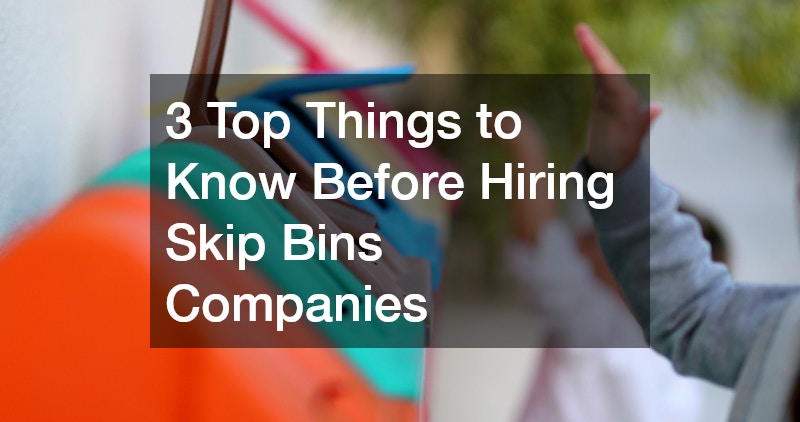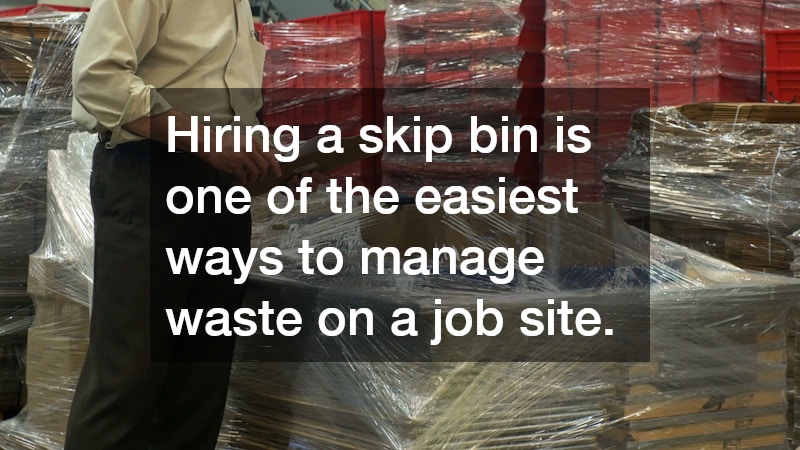
When it comes to managing waste during a renovation, clean-up or construction project, skip bins companies offer a practical and efficient solution. Hiring a skip bin saves you time, reduces trips to the tip and helps you maintain a tidy and safe work environment.
However, before booking your bin, there are a few important things you should know to make the process smooth and cost-effective.
Understanding how skip bins work, what you can and can’t put in them, and how to choose the right company can help you avoid delays, fines or unexpected fees. Whether you’re a homeowner clearing out the garage or a contractor working on a job site, planning is key.
Know What You’re Throwing Away
The first and most important thing to consider when using skip bins companies is the type of waste you plan to dispose of. Not all waste is treated equally, and mixing certain materials can lead to extra charges or even a refusal to collect the bin.
Most companies offer a few different bin types, such as general waste, green waste, construction debris or mixed heavy waste. If you’re not sure what your waste falls under, it’s best to ask before booking. For example, bricks, concrete and soil often require a separate skip from household junk or furniture.
Hazardous materials like asbestos, batteries, chemicals and paint are strictly prohibited in regular skip bins. Disposing of these items requires special handling and separate services. Putting them in a general skip can pose serious safety risks and result in fines or extra disposal fees.
By identifying your waste type ahead of time, you can select the right bin and avoid surprises later. It also helps ensure your waste is processed correctly, with recyclable materials sorted and kept out of landfill wherever possible.
Understand Sizes and Weight Limits
Skip bins come in a range of sizes, usually measured in cubic metres. The most common residential sizes range from 2m³ to 8m³, while larger commercial projects may require bins up to 30m³. Choosing the right size is crucial — too small and you may need a second bin, too large and you may overpay for space you don’t use.
When comparing skip bins companies, take note of the included weight limit for each bin size. Some materials, like soil, concrete or tiles, are much heavier than general waste and can quickly exceed limits. Overweight bins often incur extra charges, so it’s worth asking what the allowances are.
It’s also a good idea to plan where the bin will go. Most bins are delivered on a truck and require a clear, flat area to be dropped off. Check with your local council to see if you need a permit to place a bin on the nature strip or road. If you’re placing it on private property like a driveway, ensure the ground is strong enough to support the weight.
Choose a Reliable Company
Not all skip bins companies offer the same level of service, so take a little time to research before booking. A reliable company should offer clear pricing, easy booking and responsive customer support. Look for businesses with a local presence, as they’re more likely to deliver on time and understand any council regulations in your area.
Online reviews can give you a good sense of what to expect. Look for comments about punctuality, customer service and how well the company handles complaints or last-minute changes. Some companies include delivery and collection in their pricing, while others may charge extra. Make sure you understand all costs upfront.
A good skip bins company should also guide bin types, weight limits and prohibited items. If the website doesn’t have detailed information, a quick phone call can save you trouble down the track. Transparent communication is a strong sign of a trustworthy provider.
Sustainability is another factor to consider. Reputable companies take care to sort and recycle waste where possible. Ask about their recycling practices and how much of your waste they aim to divert from the landfill. Supporting a business that values environmental responsibility is a win for your project and for the planet.
Booking and Pick-Up Made Easy
Most skip bins companies offer flexible hire periods, often ranging from a few days to a week or longer. Make sure to book early if you’re planning to hire a bin during busy periods, like public holidays or school breaks. Delays can occur if demand is high or if your job site is difficult to access.
Once your bin is full or your hire period ends, collection is usually arranged with a simple phone call or online form. Just make sure the bin is not overfilled — materials should not rise above the rim, as this poses a safety risk during transport. Overfilled bins may be refused pick-up or charged additional handling fees.
Make Your Waste Removal Hassle-Free
Hiring a skip bin is one of the easiest ways to manage waste on a job site, at home or during a big clear-out. By understanding what you’re throwing away, choosing the right size and working with a reliable provider, you can make the most of this service without the stress.
Skip bins companies simplify the clean-up process, but a little preparation goes a long way. Do your research, know your waste type and always ask questions if you’re unsure. That way, you’ll avoid common pitfalls and enjoy a smooth, hassle-free experience from start to finish.




